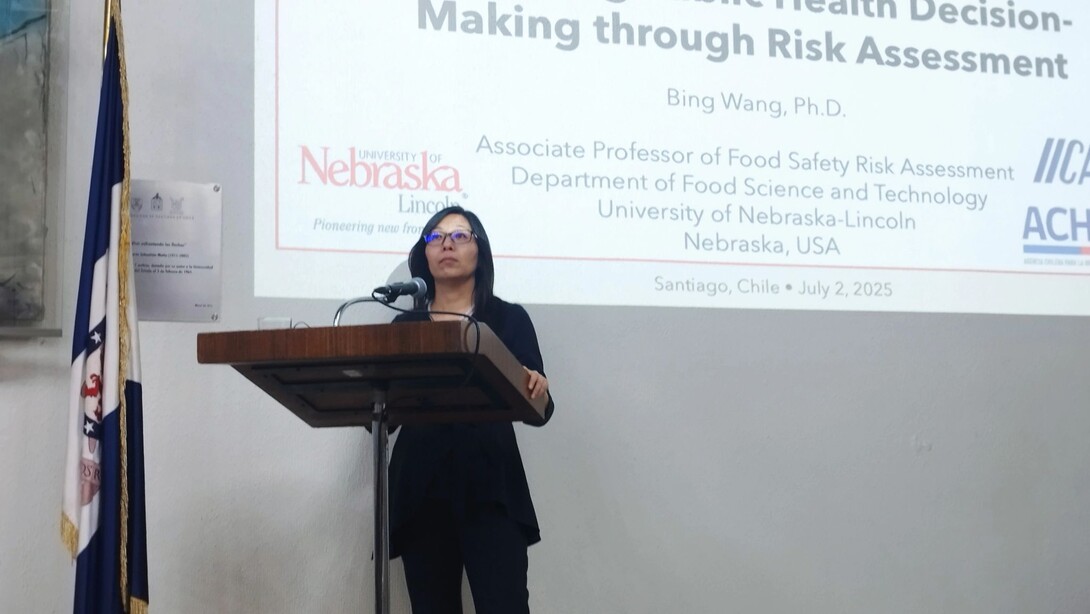
What happens when rigorous science meets policy? Real change. A team from the University of Nebraska–Lincoln’s Department of Food Science and Technology recently demonstrated this firsthand during a pivotal mission to Santiago, Chile, where their research is directly influencing national public health and food safety regulations.
In July, Bing Wang, associate professor in food science and technology, and Andrew Ortiz, a doctoral student, both members of UNL’s Food Safety Risk Assessment Research Group were invited to participate in high-level meetings with Chilean officials to advance policies rooted in Quantitative Microbial Risk Assessment. Their study, “Evaluating the Reuse of Greywater for Irrigating Ground-Level Fresh Produce: A Quantitative Microbial Risk Assessment of Generic E. coli Contamination on Lettuce,” served as the foundation for these discussions.
Commissioned by Chile’s Agency for Food Quality and Safety (ACHIPIA), the study addressed a critical question posed by the Chilean Congress: Can greywater be safely reused for irrigating fresh produce consumed raw? The findings are now guiding Chile’s development of new legislation on wastewater reuse, a landmark step toward establishing the country’s first risk-based standards for agricultural water safety.
The visit, organized in collaboration with ACHIPIA, showcased UNL’s leadership in food safety risk assessment and included:
- Water Quality Symposium: Hosted at the University of Santiago, this event brought together stakeholders from agriculture, science and government. It sets the stage for national conversations about water reuse and food safety, a growing priority for Chile’s policymakers.
- Risk Assessment Workshop: Held at the Faculty of Veterinary Sciences, Pontificia Universidad Católica de Chile (ranked as the second-best university in Latin America), this technical workshop trained postdoctoral researchers and graduate students in QMRA methods. The session deepened local capacity to evaluate microbial risks and develop evidence-based decisions.
- High-Level Policy Meeting: Wang and Ortiz joined a roundtable with vice ministers and regulatory leaders to explore how QMRA findings can directly inform Chile’s greywater reuse policies, potentially making the country a global benchmark for integrating science into food safety legislation.
“This wasn’t just a visit, it was a turning point,” ACHIPIA said in a statement. “We’re seeing UNL’s research directly inform international policy, ensuring safer food systems for the future.”
As water scarcity intensifies globally, Chile’s proactive approach to greywater reuse sets an impactful precedent. Thanks to the collaboration, Husker researchers are at the forefront of this transformation, bridging science and regulation to address one of agriculture’s most pressing challenges.
For Wang, Ortiz and the Food Safety Risk Assessment Research group, this was not just the culmination of months of technical work.
"It was the clearest validation of why that work matters," Wang said. "The project has become a bridge between nations, between science and regulation, and between today’s challenges and tomorrow’s solutions.
"This marks not the end, but the launch of a new era of collaboration, where Nebraska researchers and Chilean authorities continue working side by side to design safer, more resilient food systems for Latin America and beyond."
Wang also noted that the collaborative project between her research group at Nebraska and ACHIPIA, the Chilean Agency for Food Safety and Quality, was made possible through financial support of the Inter-American Institute for Cooperation on Agriculture and the Daugherty Water for Food Global Institute at Nebraska.
"We gratefully acknowledge their contributions, which have enabled us to advance risk-based approaches for improving food safety and promoting sustainable agricultural practices in the region," she said.







